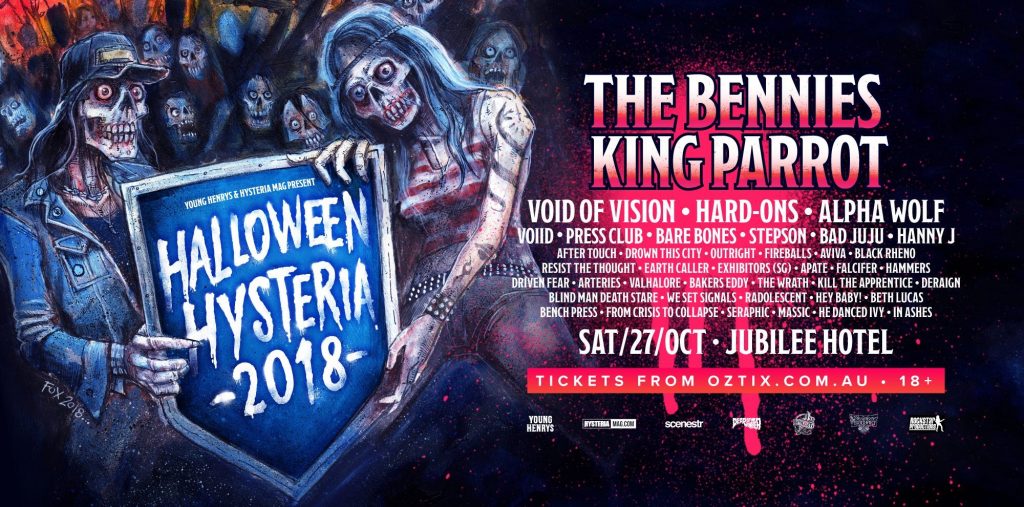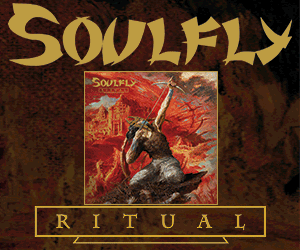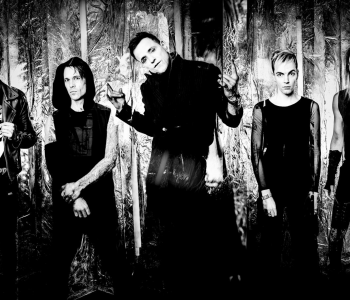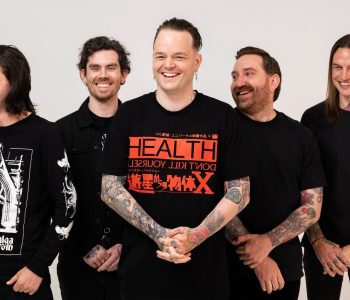Korn‘s Jonathan Davis was so excited by ORGY that he created his own record label …
Hellions redefined hardcore.
REVIEW: Hellions – Rue
In 2016, Opera Oblivia arrived and the accolades rolled in. It debuted at #4 on the ARIA Album Charts and landed a spot as a triple j Feature Album. Hell, it was even nominated for an ARIA Award for Best Hard Rock/Heavy Metal Album. We even gave it a perfect score—something our stick-in-the-mud Editor is usually allergic to.
It was the record that changed it all for them, and the band admits there was pressure to follow it.
“It was a looming thing but it was never really spoken about”, says frontman Dre Faivre.
“We all wanted to be the best for each other this time around. On our last record, I feel like we found our formula and then we just thought what can we do next? We’ve always been a bit hesitant, but on Rue we were a lot freer with each other to explore those options.”
“People were really waiting to hear new stuff from us, so just knowing where to go was a little bit daunting,” adds bassist Matt Gravolin.
“We were really hard on ourselves this time around; we might have actually been overly picky. We tried everything we could and just experimented a lot more with singing and melodicism in its various forms. We tried a lot of ballads and that sort of thing as well. The amount of songs we had, we nearly cut in half and what’s left is what you’ve heard.”
While plotting out the themes of each of the songs on Rue, the band got a little introspective. Gravolin, in particular spearheaded the lyrical content. “I’ve never really been into philosophy before, but ever since we finished Opera Oblivia I’ve found it really interesting. In all my favourite stories, the characters are really heavily informed. It’s quite dark but I feel like there’s a lot of merit to it as well.”
Starting with Friedrich Nietzsche, Gravolin fell into the work of theorist after theorist before discovering Thomas Ligotti. “He’s a horror author and his book The Conspiracy Against the Human Race was a massive influence on the record. What it says basically is that we are missteps in evolution, we’re not meant to be. We’re burdened with higher consciousness, it’s more so a curse than a blessing. I think that went a long way to explain the sufferings that we endure each day. All the anxiety and the depression and the things that riddle a lot of people, things I have suffered with for a long time as well.”
At heart, if I was to assess myself I’d like to think that I am as kind as I can be and that I do all the good that I can in as many ways as I can for other people. That’s really the only purpose of life at the end of the day and there’s no real happiness to be found outside of that.
[MATT]
Going on to discuss the lyrical content, drummer Anthony Caruso explains the importance of the record title itself. “Rue as a word has a bit of a double meaning. There’s one aspect that deals with regret or repentance and then there’s the other that deals with compassion or pity—it’s a little bit of a reflection on the fickle nature of us humans. We’re of the mind that there are two parts of a human personality; the record is our way of speaking about how we navigate that. It’s a bit of a journey of what our end goal is as the human species in spite of how our minds work.”
Echoing the same sentiments Gravolin says, “At heart, if I was to assess myself I’d like to think that I am as kind as I can be and that I do all the good that I can in as many ways as I can for other people. That’s really the only purpose of life at the end of the day and there’s no real happiness to be found outside of that. As I’ve gotten older I’ve developed a bit of a loathing for the world and the state that it’s in, on the larger scale of things with celebrity worship and the state of the governments here and in the US, terrorism and all that sort of thing.”
“It feels like it’s hard to maintain that goodness within when there’s so much turmoil in the world, these figures that we praise are so consuming and our personal relationships are really suffering because of it because we take all of that on board so much and we apply it to our own lives. I guess that’s the division and I wanted to find the equal balance between those two. There’s a lot of rationality and purpose in either one.”
Making the trek to Thailand, Hellions found their home in Karma Sound Studios once more. Here, they once again worked with Shane Edwards—the producer lovingly referred to as the fifth member of their operacore crew. “He’s in the band”, Faivre says. “He just doesn’t play live, but he’s been there since day one. He used to record a bunch of stuff for the guys in our old band and for our old band as well so the relationship was already there. When Hellions started, it all just clicked so hard.”
Laughing, Caruso adds, “He knows us, probably better than we know ourselves as far as our musical talents go! We’ve literally worked with him for over 10 years now. He just seems to be one of the people that completely and wholeheartedly understands what we do and what we’re trying to do. He’s as involved as any of the performing members are when it comes to the song writing and everything. I could not imagine working with anyone else on a Hellion’s record, it just feels natural and it would be weird to do anything without him. I don’t think it would be Hellions without Shane.”
Reflecting on their time at Karma Sound Studios, all agreed it was an intense recording process.
“I think we went to Thailand a total of two or three times this time around.” says Faivre. “It was just about walking away and digesting the record. We’ve always done things that are very fast paced in the sense of releasing new records and touring off the back of them. We’ve done so much in the time that we have been together, so we had some downtime where we really stopped for a moment and listened to our album full on. We maybe actually listened to it too much. It was a negative at first but in the end it ended up being a positive.”
“We learnt a lot about ourselves and the words that we are saying. That’s not to say we didn’t know what we were singing about before, but I think we completely and utterly stand by what we put on paper across the board. We’re walking away very happy with it.”
Weighing in, Caruso notes, “This was probably the most intense recording process that we’ve ever undergone with any of our records. We were recording for over a year and there we so many changes to each song lyrically and musically throughout the process. It wasn’t so much a challenge to be able to tie in the themes, it was more so a challenge in pushing ourselves to be better and making those hard calls and really challenging each other like, why is this part here or why are we saying this or we’re speaking about some pretty grim stuff, why does this song sound happy?”
If there’s one thing that defines Rue, it’s this sonic duality. It isn’t always black and white though. The divide between pessimism and humanitarianism isn’t split down the middle and the songs don’t always fit the story. As Gravolin explains, “It just makes the song sound darker when you play some really dark lyrics against some bright sounding music.”
“For example, X (Mwah) is particularly bouncy and boppy but the lyrics are probably some of the darkest I’ve done. I think it makes it all the more darker putting those words against really bright music. I find it to be really creepy and I think that’s the best way to get the desired effect across. It brings to life this mask people wear when one minute everything is alright and then the next minute it’s not but you just go about your day dancing around the way that you feel inside.”
Almost naturally, this shift in sound coincided with a switch in roles, with Faivre moving away from the role of de facto frontman. “The vision ended up being a little bit grander than what our ability allowed us to do”, explains Gravolin while laughing.
I think we completely and utterly stand by what we put on paper across the board. We’re walking away very happy with it.
[DRE]
“We shuffled around the roles a lot so it was a bit of a struggle. Dre did a lot more pitched screaming which he hasn’t done too much of before, I did a lot more singing than I’ve ever done and Anthony did a lot of the vocal harmonies. We really threw ourselves into the deep end, especially with the vocals this time around. It took a while for it come together into sounds that were halfway decent. We all had to really work at our singing and with learning anything new it takes time. We certainly learnt a lot this time around and we like to up our game as far as our musicianship goes. We’re all really proud of how it came together in the end though.”
Diehards from the days of Blacktown Masonic will notice Rue’s expansion of the band’s early theatricality. When pressed on their debut record, Caruso laughs, “To us, Die Young was a demo; it felt like a demo anyway. It was the first thing we did as a band and we were still figuring out what we wanted Hellions to be and learning more about each other. We’ve always had the mindset that we want things to be grand and a little over the top but I feel like until we did Opera Oblivia, how to capture that hadn’t sunk in for us.”
Nailing this theatricality wasn’t without its challenges though, with Gravolin admitting that some of the songs had to be rewritten. Record opener Blueberry/Odyssey was one such example.
“Those verses were written four or five times I think. We couldn’t find the right vocal flow and the right beat so Anthony had to play around with that a lot. We had so many different versions of it and it was maddening, it took so long to get it to where it’s at.”
“We changed the speed of the verses and the chorus and changed around the structure and the words and the flow and everything. It was a particularly maddening song because we all knew it had this wonderful potential but we couldn’t quite bring it to life, but when we did it was the most rewarding thing; it just took so fucking long.”
There’s no doubt that Hellions have set themselves up for great things though, especially if the response to their ‘Hellions Hotline’ is anything to go by. “We have bad days too and to read some of the stuff that’s been texted through is sick,” Faivre says, enthusiastic.
“It’s just a reassuring feeling—not that you’re doing something right in the world but that you’re doing something.”
Rue is out 19 October via UNFD. Pre-orders are available now.






